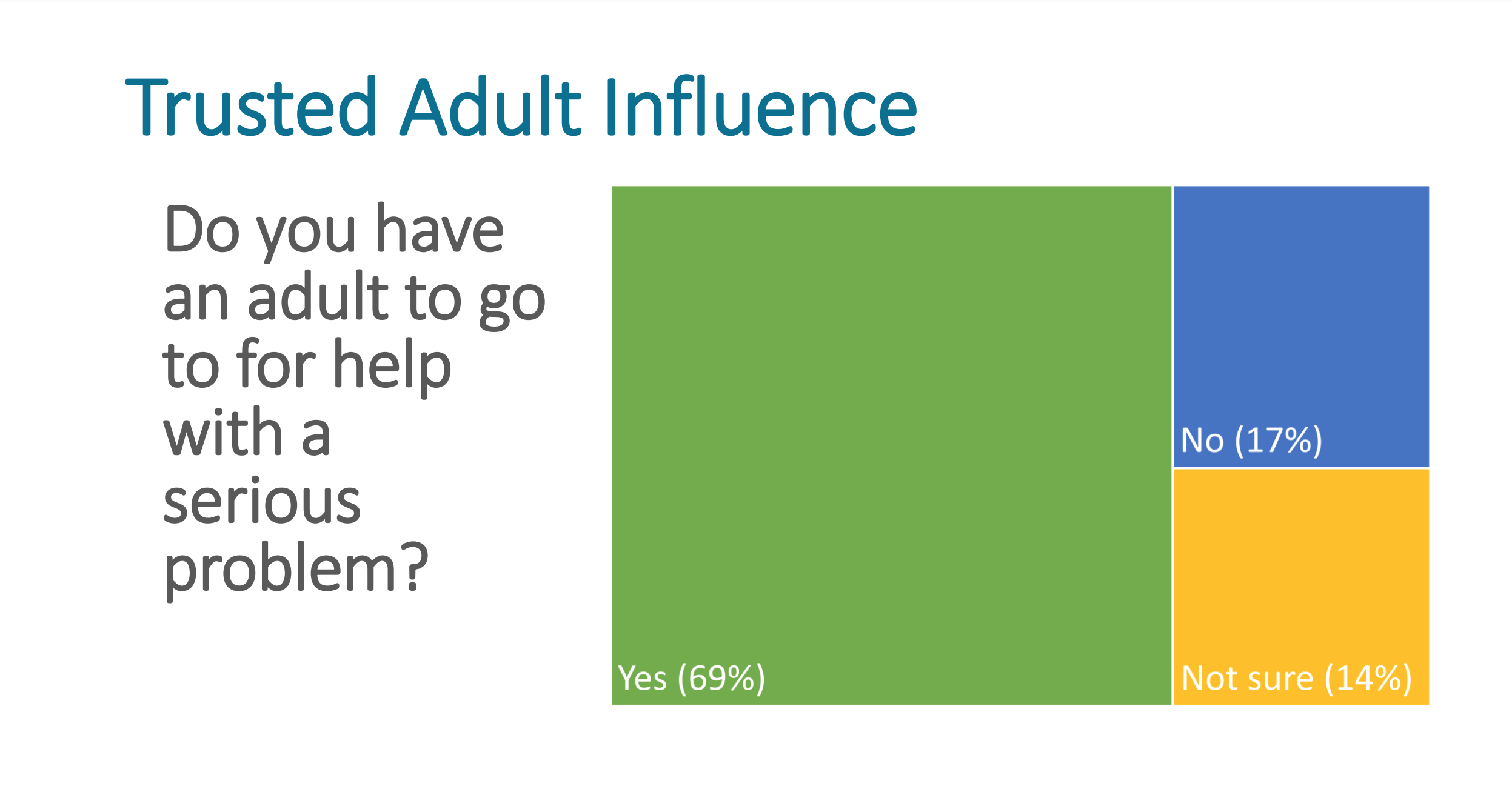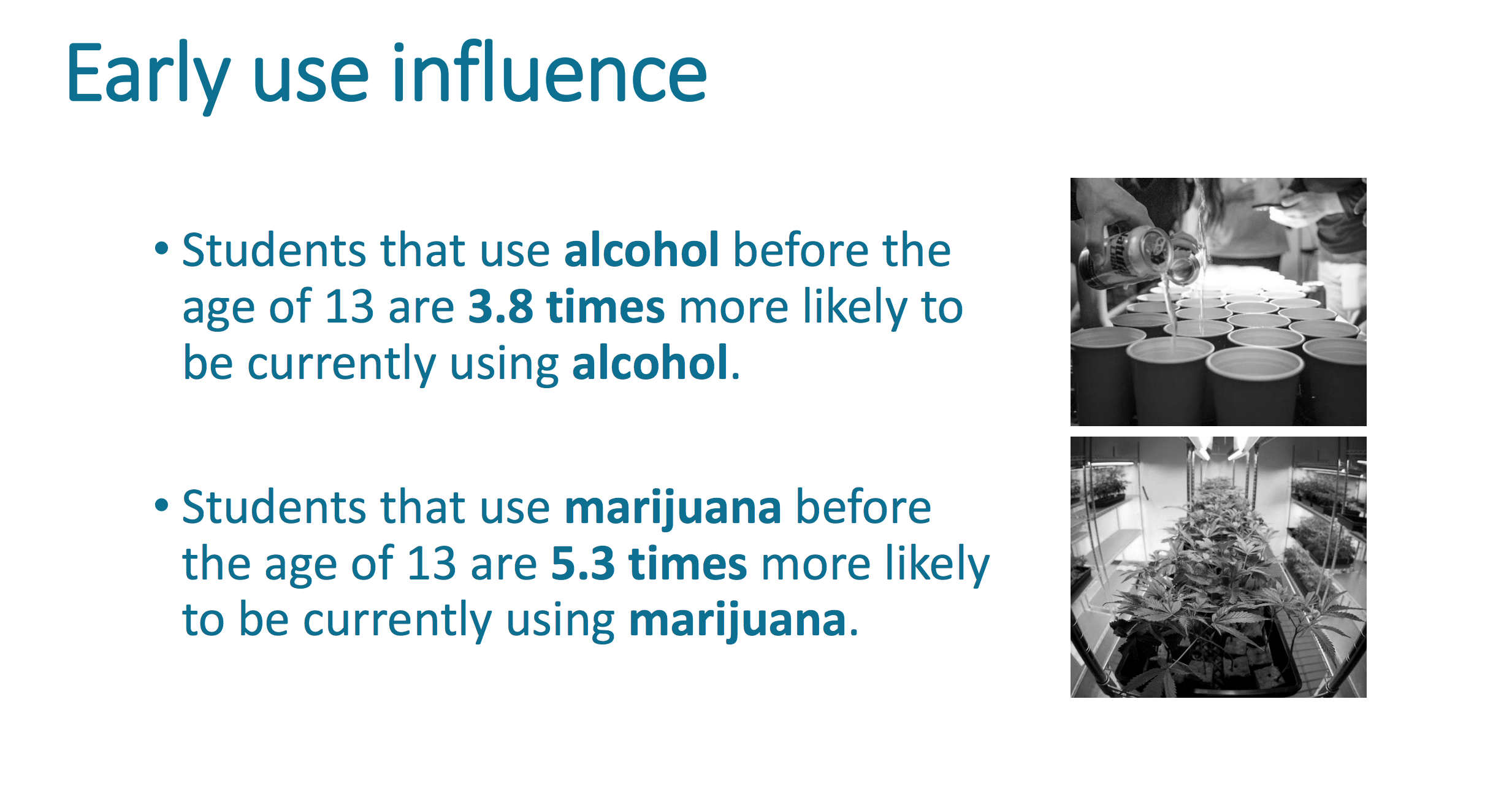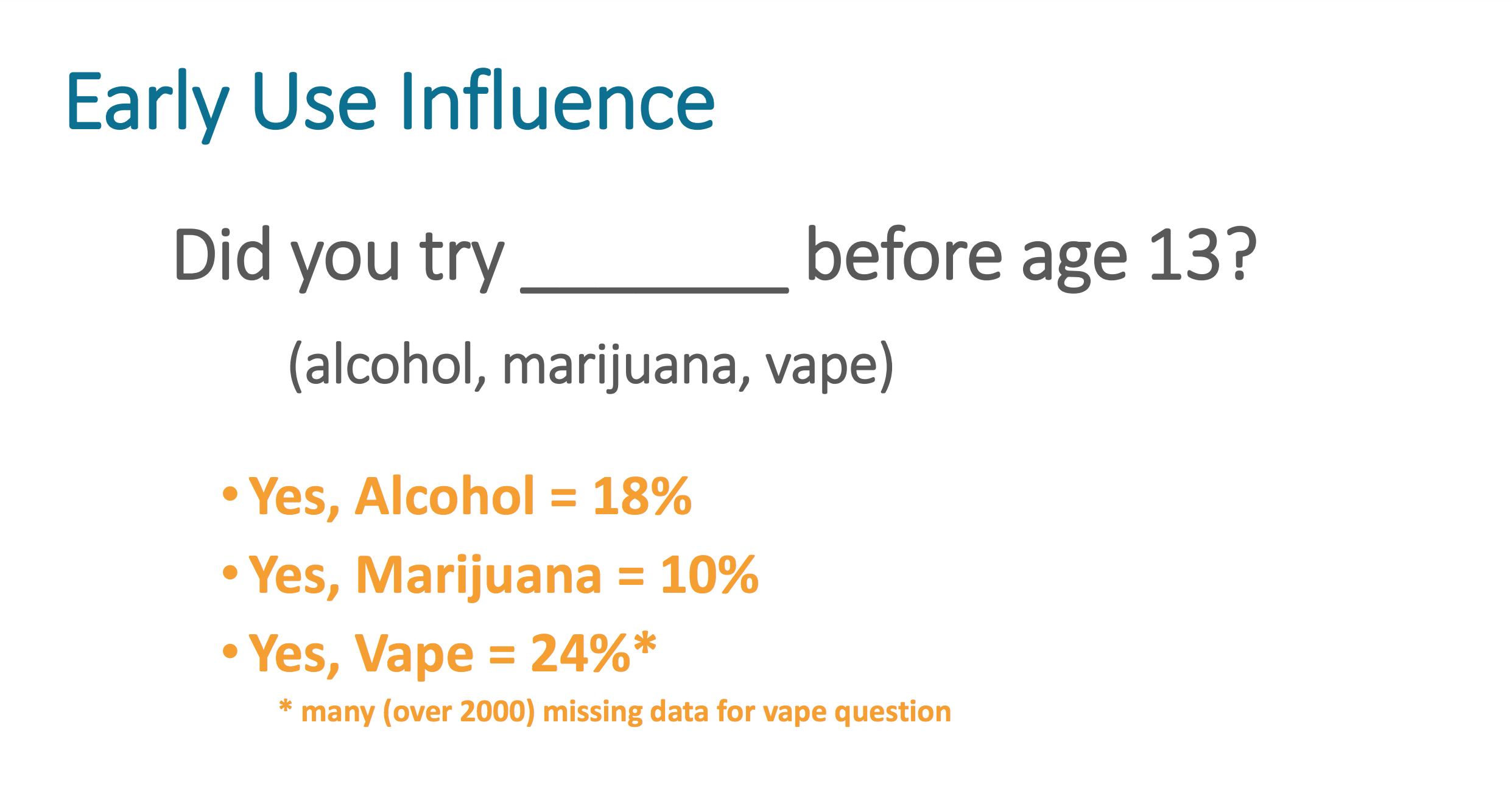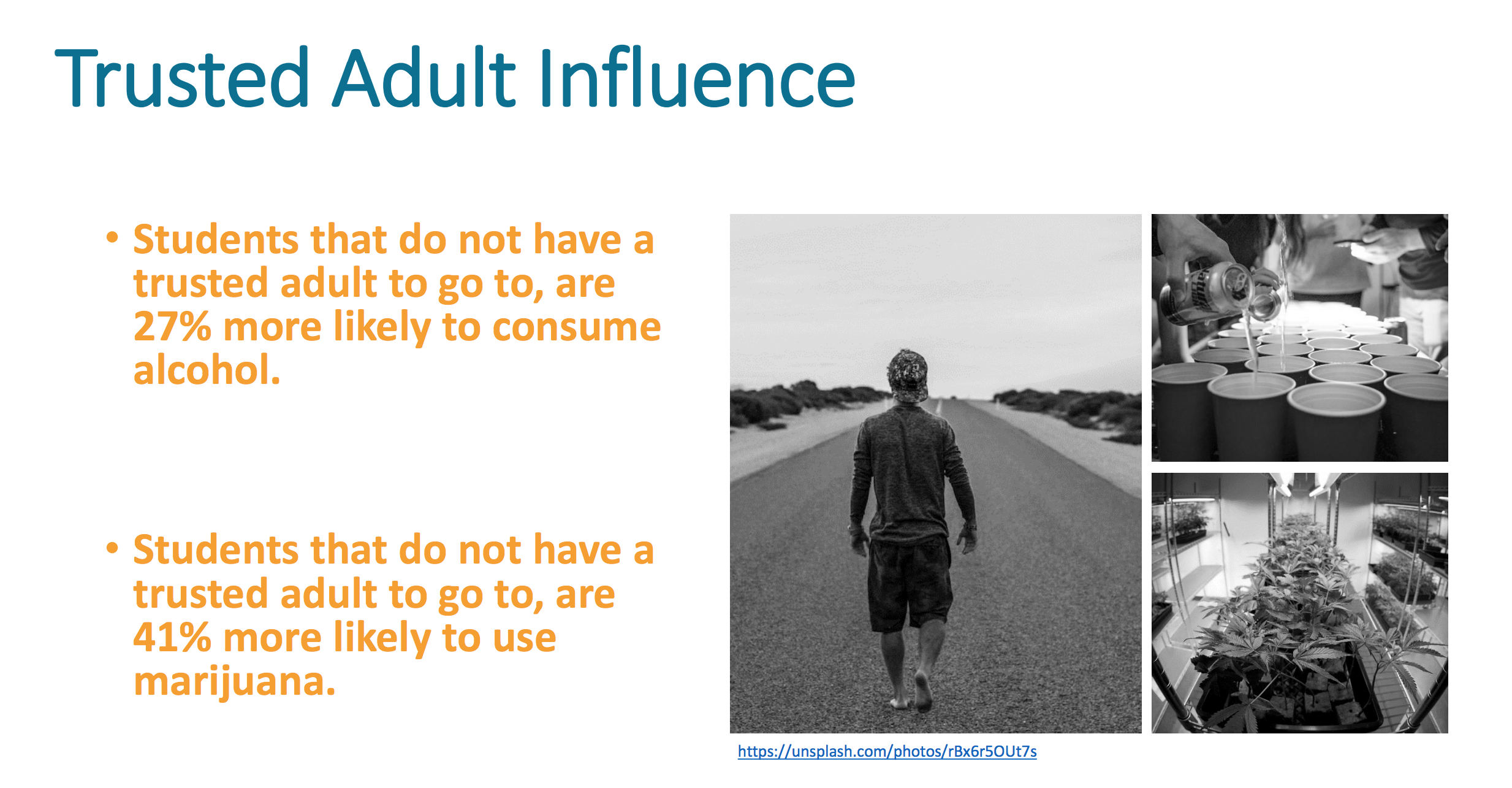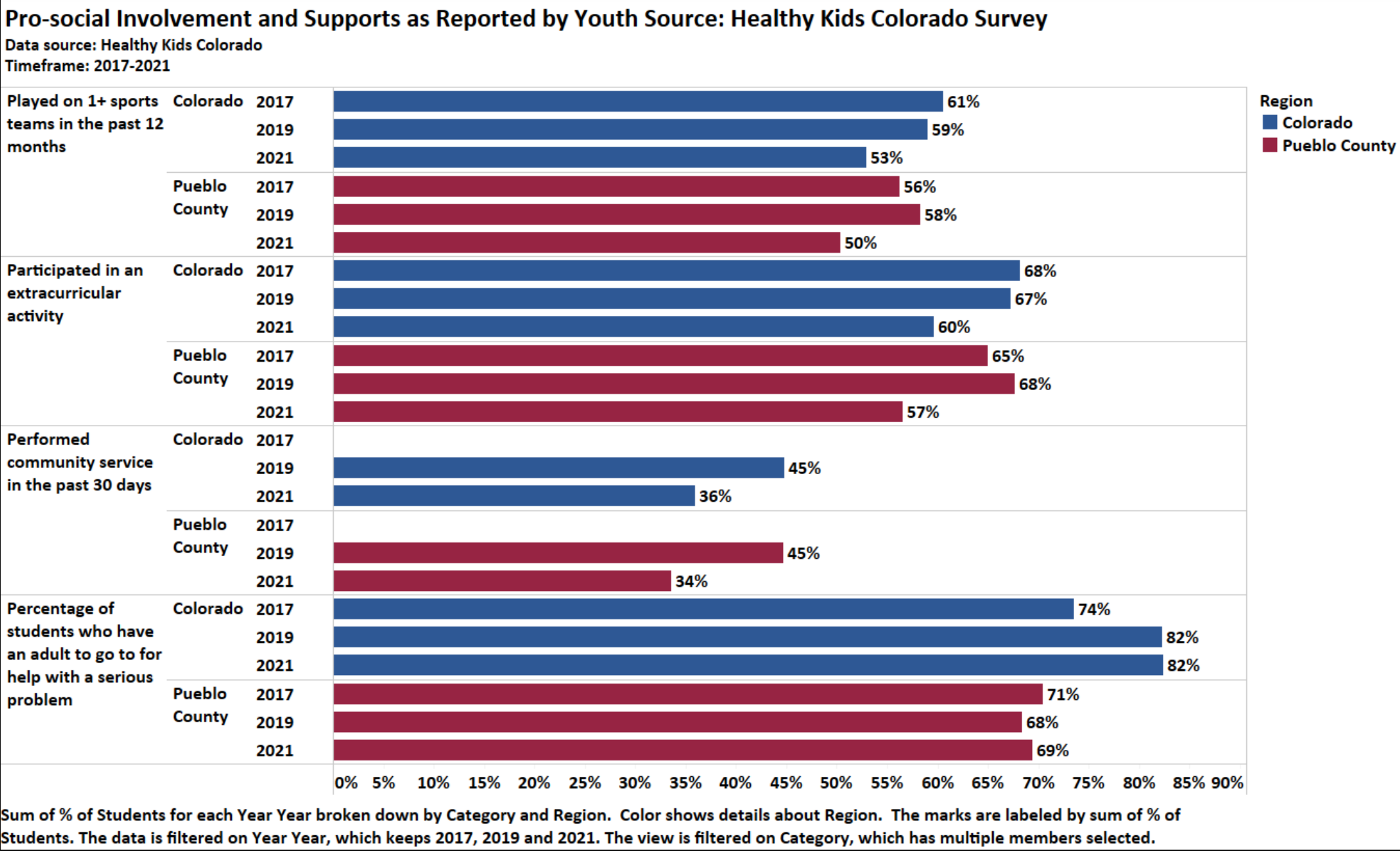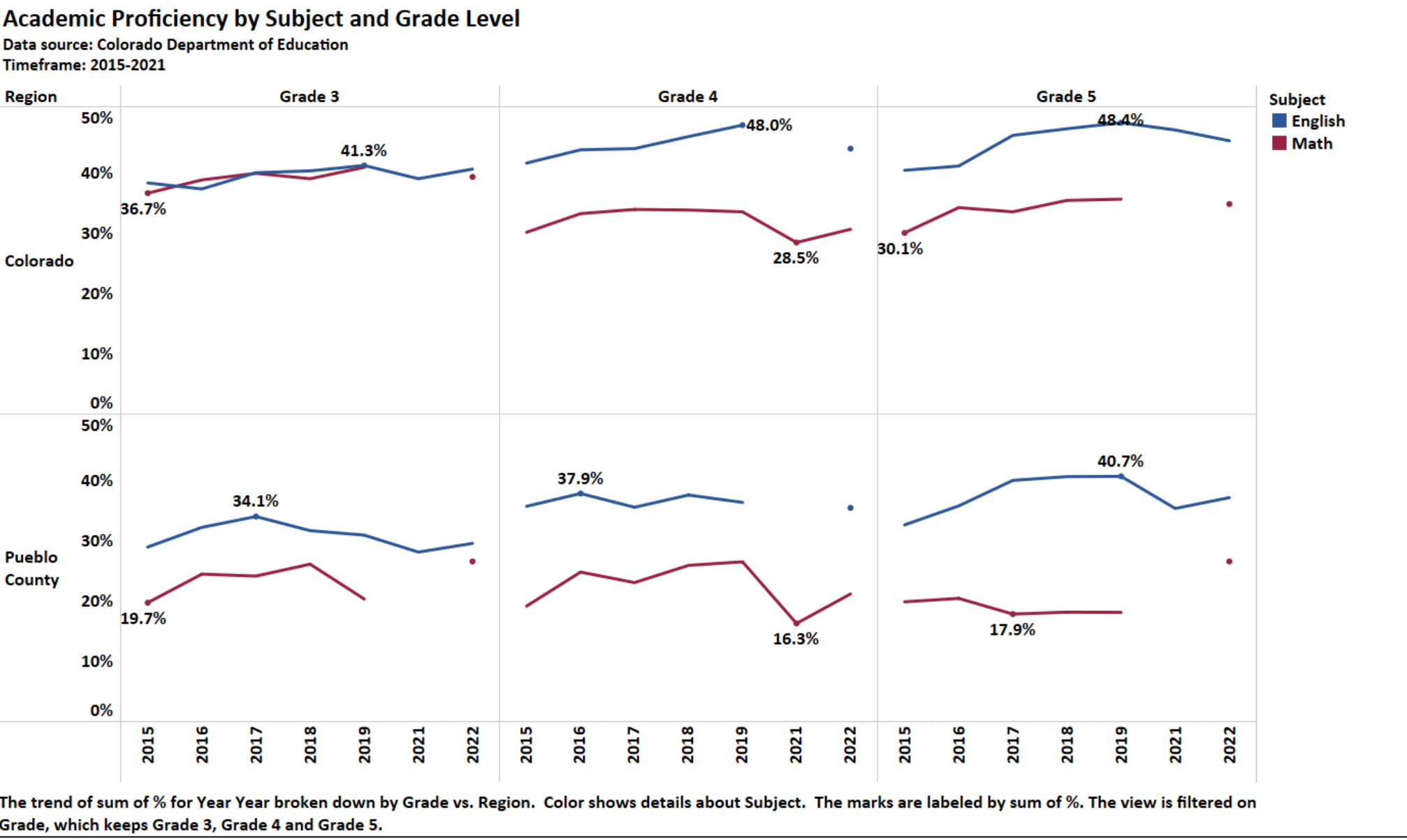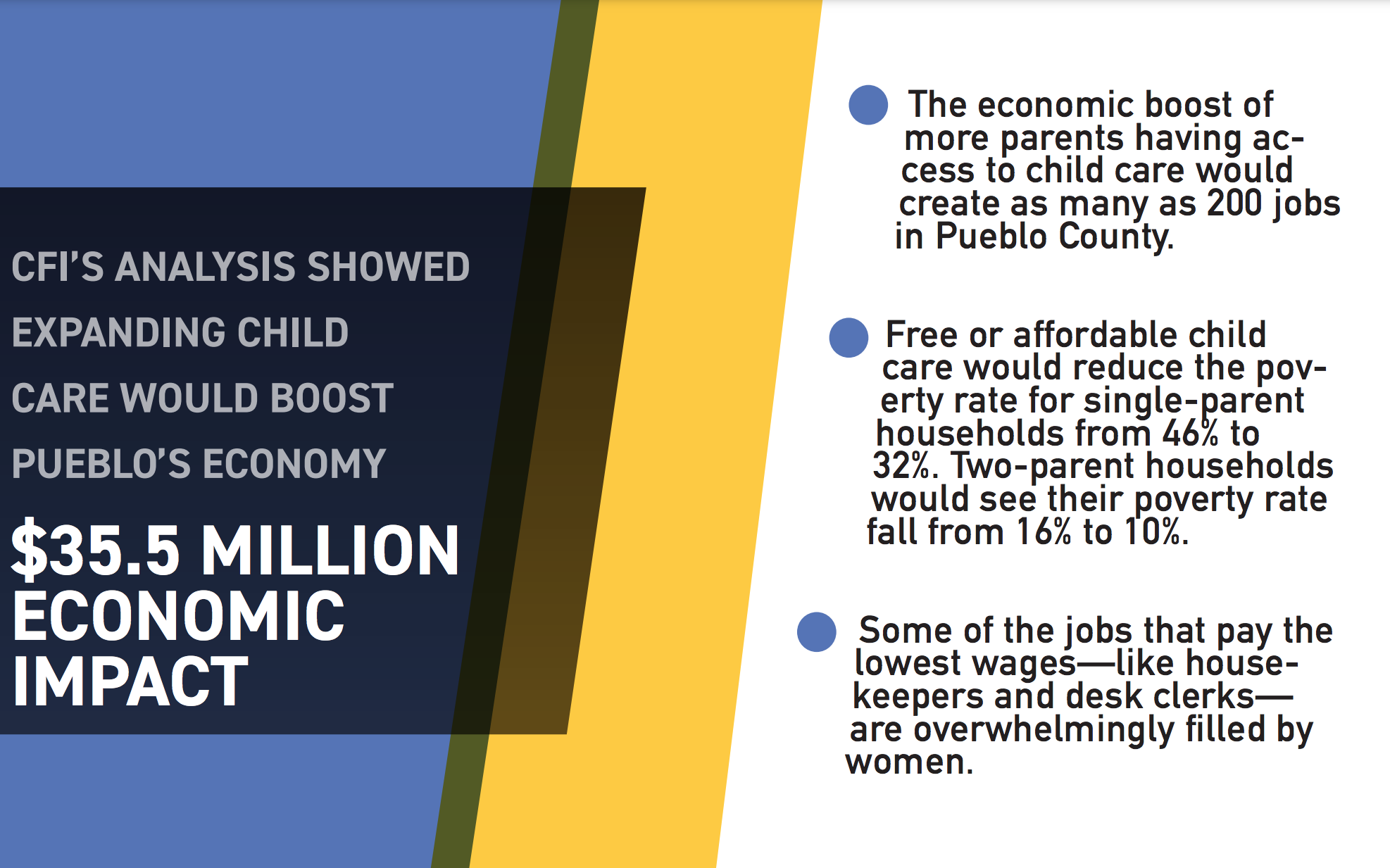Overview of CTC and the local coalition
In August 2016, the Pueblo Department of Public Health and Environment received funding to implement the Communities That Care (CTC) prevention-planning system. Created by the University of Washington’s Social Development Research Group, the CTC system is an evidence-based program for members of a community to work together to promote positive youth development and prevent youth problem behaviors such as substance abuse and violence. Pueblo CTC’s efforts seek to reduce problem behaviors and promote positive behaviors by addressing root causes (risk and protective factors). From decades of research, risk factors have been shown to increase the chances that youth will become involved in problem behaviors while protective factors have been shown to shield the effects of exposure to risk factors.
CTC has community members and young people involved in our work who provide their skill and passion, as well as real-world experience for addressing the needs of young people. CTC’s efforts are possible with the support of public health, education, health and human services, civic organizations, law enforcement, local businesses, and other concerned citizens. These partners are critical in gathering community assets and resources needed to sustain our prevention efforts now and in the future.
Pueblo CTC & Local Successes
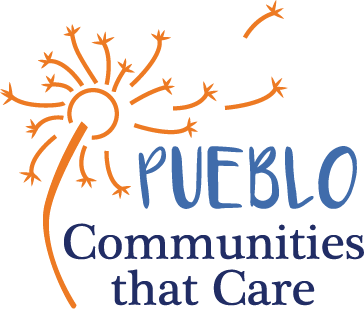
Our Strategies and Community-Level Outcomes
Pueblo's CTC Process
The Pueblo Department of Public Health and Environment received five years of Communities That Care funding from the Colorado Department of Public Health and Environment. The coalition analyzed local-level data to prioritize risk and protective factors (Academic Failure in Late Elementary School- risk factor, and Opportunities for Prosocial Involvement in the Community- protective factor), to prevent youth substance use.
Coalition members identified potential strategies for community implementation; all strategies were included in a well-researched and evidenced-based Menu of Strategies provided by CDPHE and addressed community-level changes. Based on an extensive local needs assessment around our risk/protective factors, the coalition recommended two community-level strategies to be prioritized.
To mitigate academic failure, CTC is working to increase quality childcare (strategy); to increase prosocial opportunities, CTC is working to make community spaces safe and healthier for young people (strategy). The coalition identified implementation activities, evaluation plans, and funding considerations for each prevention strategy. Implementation plans addressed gaps in community resources or capacity to implement strategies aligned to our community's priority risk and protective factors. The coalition also drafted community-level outcomes to ensure our work can be tracked.
The coalition successfully implemented the first year of the strategies’ implementation plans.
Implementation continued with the strategy teams completing more than 60 activities, and each team completing one of their objectives. In addition, the coalition received a mini-grant from the Colorado Trust to fund a new community mural, assisted in applying for several grants with the City to improve walkability, and completed the grant application for the next five years of CTC funding from the Colorado Department of Public Health and Environment.
Implementation continued for the third year. There was a total of 60 CTC meetings with an average of nine coalition members attending each meeting which speaks to the high commitment of coalition members. Because of the evidence of community collaboration, strength of the coalition, and affinity of CTC, Pueblo was one of 30 communities in Colorado that was re-funded with another five years of CTC funds from CDPHE.
Implementation continued for the fourth year. There was a total of 49 CTC meetings with an average of nine coalition members attending each meeting. The coalition participated in several skill-building and personal growth opportunities including a training about interpersonal effective communication (i.e., how to have difficult conversations) and equity trainings.
Implementation continued for the fifth year. There was a total of 63 CTC meetings with an average of eight coalition members attending each meeting. To build skills to do CTC work, several coalition members participated in monthly equity, diversity, and inclusion workshops facilitated by the Office of Health Equity from CDPHE; coalition members also participated in an advocacy training and positive youth development training.
Our Long-Term Outcome Goals
Pueblo’s outcome goal for youth health & behavior: By 2030, youth marijuana use will be reduced by 10%.
- By 2025, CTC will create a cohesive community culture that values education and encourages youth to be engaged academically.
- By 2025, CTC will foster positive relationships in a safe and healthy community where youth have diverse opportunities for rewarding and meaningful experiences.
Risk factors
Risk factors are aspects at the biological, psychological, family, community, or cultural level that precede and are associated with a higher likelihood of negative outcomes
Pueblo CTC’s Risk Factor
Academic failure beginning in late elementary school. Beginning in the late elementary grades, academic failure increases the risk of all five problem behaviors (substance abuse, delinquency, teen pregnancy, school drop-out, violence).
Pueblo CTC’s Strategy #1
Build public support for quality childcare early in life.
Protective factors
are aspects connected with a lower chance of negative outcomes or that reduce a risk factor’s impact. Protective factors may be seen as positive countering events.
Pueblo CTC’s Protective Factor
Opportunities and rewards for prosocial involvement. Having close access to safe spaces in the community is associated with lowered risk of substance abuse.
Pueblo CTC’s Strategy #2
Build public support for creating community spaces for youth.
Why we’re addressing our risk and protective factors
A key goal of CTC is to identify which risk factors, protective factors, and problem behaviors are prevalent in a community, and implement evidence-based programs, policies, and strategies to address the community’s unique profile. Our Data workgroup regularly collects and monitors youth behavioral data to ensure the work is making a positive impact and for quality improvement purposes.
How We’re Addressing Youth Substance Use
The quality childcare strategy has objectives focused on educating leaders and families on “quality” based on the state quality rating system and, more importantly, extending resources and training opportunities so that more facilities can become quality childcare. The community spaces strategy has objectives focused on making youth spaces and programs more accessible, safer, and incorporating aspects of positive youth development into the community.
!-- Qualitty Childcare -->
Quality childcare strategy team successes/wins since starting implementation:
Community spaces strategy team successes/wins since starting implementation:
Quality Childcare Strategy Team
- By December 2025, there will be an increase in the accessibility, availability, and affordability of high-quality childcare.
- By December 2025, there is increased knowledge about safe and healthy childcare environments, as well as an increased utilization of trainings and resources that promote the simple best practices around safe and healthy childcare environments, among Pueblo parents, caregivers, friend, family, and neighbor (FFN) childcare providers, and licensed providers.
- By 2025, there will be a local ballot proposal regarding the reallocation of existing funds going to early childhood.
Community Spaces Strategy Team
- By December 2025, there will be changes to the built environment recommended from completed community scans.
- By December of 2025, there will be a city ordinance(s), law(s) and/or policies which support shared-use routes to increase accessibility and use of youth friendly spaces.
- By December of 2025, there will be policies which support safe and affordable public transportation for youth.
Annual Strategic Reflection Sessions
The annual strategic reflection session has been proved to be the most valuable evaluation tool of strategy team efforts. More so, it provides a way for strategy team members to visualize how their efforts have (or have not) shifted capacity in the context of a big picture scale. The annual strategic reflection session occurs every year as a way for strategy teams to evaluate if their work is making meaningful changes in the community.
During the strategic reflection session, team members first review the team’s data trends and engage in discussion around their reactions to this data. The whole team then comes together to reach agreement on how capacity regarding their objectives has or has not changed, and why. The results of this process evaluation are then used to identify priority areas for work in the next year and what work should be included in the implementation plan.
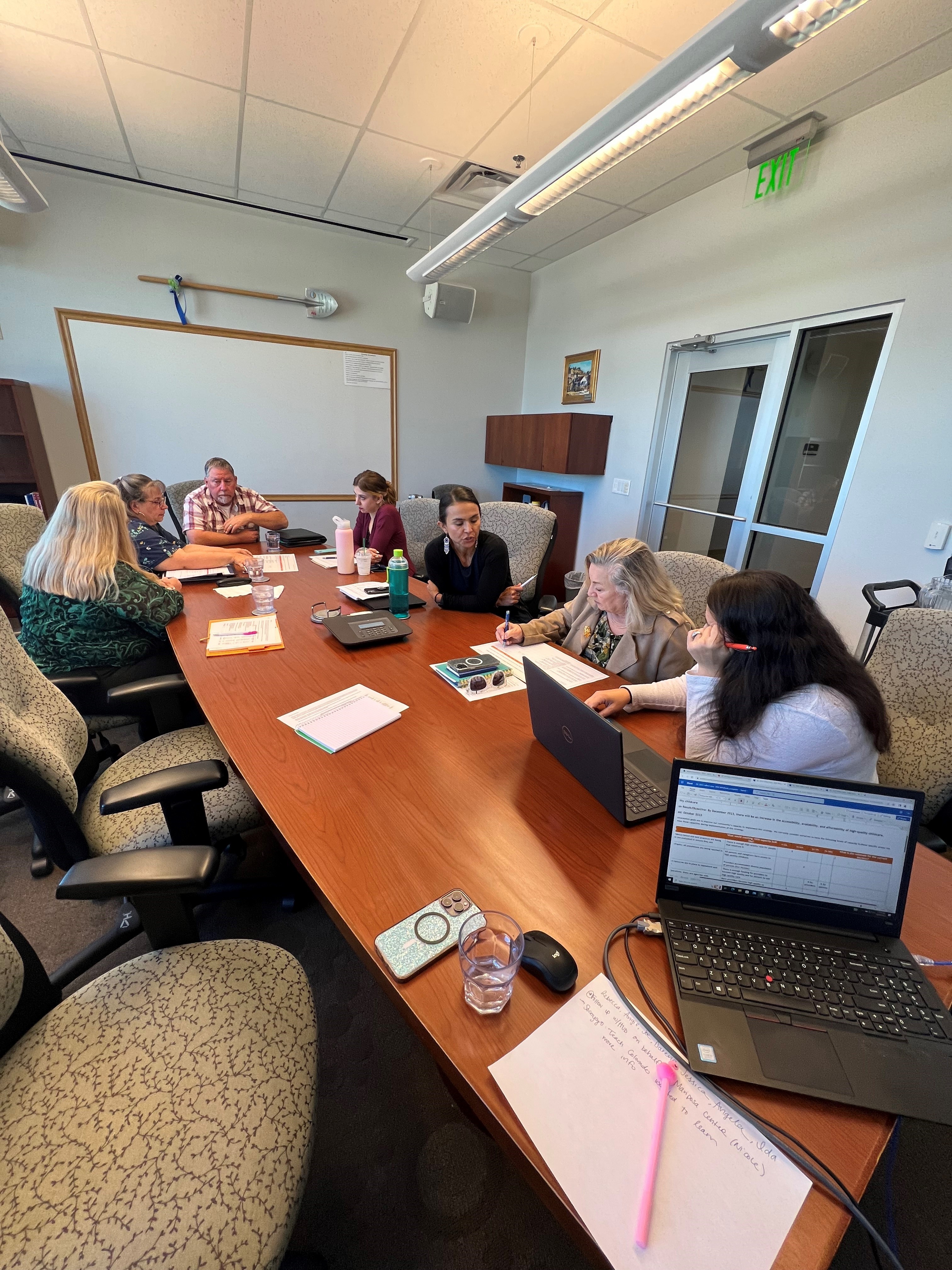
SoCoYoGo Program
Team members created a workgroup specifically about SoCoYoGo — a program to incentivize youth 13-18yrs to participate in prosocial opportunities by rewarding them with local discounts. Learn more at www.Socoyogo.com or download the app on iPhone or Android.

SoCoYoGo Committee’s Vision
- All Pueblo County youth will have access to affordable positive and healthy opportunities and locations that will decrease the community’s rate of youth delinquency, substance use, and truancy.
- Our Commitment to You: This collaboration is not meant to be extra work on the business. We want to bolster your profits and not impede them. When considering the rewards that your business could offer, please know we are reaching out to serve the community’s youth population and are willing to work with you to make that happen.
SoCoYoGo's Goal
The Southern Colorado Youth Go (SoCoYoGo) online platform will address and decrease accessibility, affordability, and connectivity barriers youth have when participating in positive and healthy opportunities in Pueblo County by incentivizing youth to visit pro-social locations and earn rewards redeemable at local businesses.
The SoCoYoGo Platform:
- Destroys the barriers to youth accessing local positive locations (cost, transportation)
- Incentivizes youth: the more healthy locations youth visit, the more rewards they earn!
Collective Impact
What is “collective impact”?
A data informed collaboration of community passion, potential, and power from diverse stakeholders creating a comprehensive support system for the Pueblo Community.
The 5 Conditions of Collective Impact
| Common Agenda |
|
| Shared Measurement |
|
| Mutually Reinforcing Activities |
|
| Continuous Communication |
|
| Backbone Support |
|
Our Partners
A community coalition drives all of CTC’s work. The coalition’s ideas, expertise, backgrounds, and passions uniquely contribute to the overall effectiveness of the evidence-based strategies and prioritized risk and protective factors. Below are our coalition partners who go above and beyond in making youth happier and healthier in Pueblo County.
- Pueblo Transit
- Boys and Girls Club of Pueblo County
- Colorado Youth Detention Continuum, formerly SB94
- Pueblo City Parks and Recreation
- Catholic Charities of Southern Colorado
- Pueblo Early Childhood Council
- Mentor Colorado
- Pueblo Mentoring Collaborative
- Pueblo Youth Action Board
Youth Voice is Crucial to Our Work
Positive youth development (PYD) is an approach that incorporates the development of skills, opportunities, and authentic relationships into programs, practices, and policies so that young people reach their full potential.
CTC puts the principles of PYD into practice by hiring 10 youth advisors focusing on community outreach and youth involvement and 5 youth advisors focusing on SoCoYoGo. CTC’s youth advisors bring their unique youth voice to the coalition and are integral to guiding the work that CTC does.
Here are some projects that the youth advisers have led over the years:
- Planned a slam poetry night that was teen-driven.
- Hosted a competition for high schoolers to create a video about teen substance use/mental health.
- Hosted several chalk walks where community members and youth chalked positive messages about Pueblo and youth (the last one was in Neon Alley).
- Represented Pueblo in statewide commercials for Colorado Crisis Line.
- Spoke at a variety of conferences on how to get involved in the community and how important youth voice is.
- Painted a Pueblo Strong mural in downtown Pueblo, near the Olde Town Carriage House.
- Provided youth voice in various City projects (like the transportation system and where youth hang out in the City).
- Created a mini-grant process for local youth-serving agencies; youth advisors had the opportunity to build their grant writing and philanthropy skills by awarding over $128,000 to local nonprofits.
Additionally, CTC coalition members host a PYD training every year to train more community members in how to best engage with youth in their life. To ask about PYD training or how to best incorporate PYD in your agency, contact Becky Medina ([email protected]) or Angela Sillas-Green ([email protected]) for support.
Keep up to date with what the youth advisers are working on by following them on social media at Pueblo Youth Voices.
Equity, Diversity, & Inclusion (EDI) Work
Improving the coalition’s equity, diversity, and inclusion (EDI) practices is an important goal of our Executive Committee. This goal aligns with the State’s deliverable for CTC communities to complete an equity assessment to identify the ways in which CTC community mobilizing contributes to oppression in the community.
To accomplish this goal, the coalition started monthly EDI workshops in March 2023 and concluded the series in April 2024. These workshops focused on teaching participants the importance of regulating to relate when engaging in EDI-centered conversations, including individual self-regulation, interpersonal/co-regulation, and organizational/collective regulation. As a measure of our EDI skills, the coalition completed the Intercultural Development Inventory which assesses intercultural competence - the capability to shift cultural perspective and appropriately adapt behavior to cultural differences and commonalities. The Executive Committee created an EDI improvement plan in May 2024 which outlines specific action steps CTC staff and the coalition will implement to improve our EDI skills (as measured by the annual coalition survey and IDI assessment).
“How do we currently integrate EDI into CTC work?”
Executive Committee & Funding Sustainability
The Pueblo CTC Executive Committee works hard to look “at the big picture” and guide the coalition towards long-term outcomes and goals. The Executive members review the annual coalition health survey to ensure the overall wellbeing of the team, organize on-the-spot collaborative partner meetings when health concerns arise, select and host capacity-building opportunities for coalition and community members, and maintain a strengths-based team approach. In addition to the coalition’s ongoing work, the Executive Committee leads annual reports for the community, which highlights the coalition’s major accomplishments, as well as keeping a pulse on community funding opportunities and active projects.
Becky Medina
Co-Chair of Community Spaces Strategy Team | Chief Operating Officer of Boys & Girls Club of Pueblo County
Becky began her career with Boys & Girls Clubs of Pueblo County in 1994 as a volunteer and became a staff member in 1995. As the Chief Operations Officer, Becky oversees all eight Clubhouse operations, including programming, partnership, and evaluation of the Club’s five core program areas.
In addition to working with BGCPC, she currently is on the Pueblo Mentoring Collaborative Steering Committee, Colorado Department of Education 21st Century Learning Center Advisory Committee and Communities that Care Executive Committee. She has held other roles including the Chair of the Youth Employment Council, member of the Boys & Girls Clubs Professional Association, and Vice President/Newsletter Editor for Southern Colorado Runners Club. She also was the past president for the Pueblo Parks and Recreation Advisory Commission and volunteers in numerous other community activities.
Becky earned her Bachelor of Arts in Environmental Population Organismic Biology from Colorado University – Boulder.
She believes in BGCPC’s mission for several different reasons. Becky truly believes the Club offers the best experience for youth to grow and develop in a safe, supervised environment. The Club staff are mentors to youth and partners with parents and the community. She believes that every day she receives more than she can ever give and if you truly love what you do, you will never work a day in your life.
Angela Shehorn
Chair of Quality Childcare Strategy Team | Director of Children First
Angie Shehorn, Director of the Children First Department of Pueblo Community College which is the home of the Pueblo Early Childhood Council, the Child Care Resource and Referral agency for 11 counties in SE Colorado as well as the Local Coordinating Organization for the Universal Pre-K in 6 of those counties. Her involvement in the early childhood field began with her own children, now grown, and more than 30 years later her passion continues. She works to address challenges facing families through innovative solutions. She holds multiple degrees in early childhood. She serves on the following boards: Kindred Kids Child Advocacy Center (President), Early Childhood Council Leadership Alliance (President) and the Pueblo Executives Partnering to Invest in Children.
Angela Sillas-Green
Co-Chair of Outreach & YI Workgroup | Owner of Creating Change Counseling & Education
Angela Sillas-Green has background in mental health and prevention education. She has worked with children, adolescents, adults, families, and communities in various settings, including non-profits, schools, private practice, and hospitals. Angela is passionate about social justice, advocacy, and supporting others to be successful. Angela currently offers mental health counseling and training to teens and adults through her business, Creating Change Counseling & Education.
In 2017, Angela became a member of the Pueblo County Communities that Care (CTC). She is the adult chair for the Youth Involvement and Public Relations Committee for the CTC. She also serves the CTC as a Positive Youth Development (PYD) trainer. She continues to be grateful to serve young people and her community.
Lin Chang
Chair of Data Workgroup
Dr. Lin Chang is an accomplished researcher, educator, and administrator with highly developed analytical and managerial skills that spans across positions across the states. For more than 30 years, she has been a research consultant specializing in providing services on survey design, sampling methods, data collection, statistical analysis, program evaluation, and written/oral reporting. She retired from Colorado State University-Pueblo, where she served as the Director of Institutional Research and Analysis from 2000-2013. She was previously the Assessment Director for Pueblo School District No. 60, in addition to her analytical services for private sectors. She taught psychology, measurement, and research methods at Miami University of Ohio. She was among the first to introduce data-mining technology to institutional research in higher education through case-studies and teaching at national forums. She has a B.A. in Educational Psychology from Fu-Jen University in Taiwan, an M.A. in Agency Counseling, and a Ph.D. in Measurement and Quantitative Methods both from Michigan State University.
In her retirement, Lin continued to contribute her expertise as an evaluator for a Substance Abuse Prevention Program through Crossroads Turning Points, Inc. in Pueblo. She volunteered to several community organizations, including the Pueblo Symphony, Communities That Care, League of Women Voters, and the Women's Foundation of Colorado. When needed, she provides translation services to school district students as well as local institutions.
Eva Cosyleon
Chair of SoCoYoGo Committee | MPO Manager
Eva Cosyleon joined the Pueblo Area Council of Governments, Metropolitan Planning Organization (MPO) in 2020 and in 2022 became the MPO Manager. Before joining the MPO, her knowledge of the multimodal system in Pueblo came from Sunday bike rides with her father through Pueblo’s diverse neighborhoods. The sense of freedom she felt during those rides continued throughout her life living in different cities and countries. These experiences have brought her full circle with the goal to provide safe, connected infrastructure to Pueblo youth and residents. It is because of this goal, that she finds passion in her work with the Communities That Cares Coalition. As the SoCoYoGo chair she strives to make Pueblo’s experiences accessible to all youth through better transportation planning and projects.
Gina Lopez-Ferguson
Director of Place-Based Philanthropy with Caring for Colorado/Packard Fund for Pueblo
Before joining the Caring for Colorado Foundation team, Gina Lopez Ferguson worked as the executive director of TRIO programs at CSU Pueblo and the project director for the TRIO Upward Bound program. Gina brings with her more than 20 years of diverse professional experience in the areas of college access, higher education, and philanthropy/nonprofit sector, including time spent at Colorado State University Pueblo, Pueblo Community College, and El Pomar Foundation.
Gina is also a board-certified Life Coach and is certified to administer the MBTI and True Color assessments. Born and raised in Pueblo, she is passionate about helping to facilitate positive change in the community. Areas of particular interest are social justice, equity, diversity education, college access, k-12 education, mental health and wellness, and poverty and housing. Gina graduated from Colorado College with a bachelor’s degree in anthropology and received her master’s in education from the University of Kansas. She is married to her husband of 18 years, Andrew, with whom she shares two sons. Gina loves her fur babies (two dogs, one cat), life coaching, self-care, food, and all activities that help support a mindful and balanced life.
Olivia Leyva
Equity & Engagement Coordinator for PDPHE
Olivia serves as the equity coordinator for the Pueblo Department of Public Health and Environment. She strives to embed equitable practices into grant application, program work, clinical and environment services, internal department processes, and well as community feedback and representation.
Chelsea Pool
Co-Chair of Community Spaces Strategy Team | CYDC Education Interventionist
Chelsea’s experiences as a professional in education include 16 years of working with youth in Pueblo, District 60. She completed the Master of Arts Program in Educational Leadership.
Chelsea has worked with many students who have suffered immeasurable trauma. She has been successful in connecting with and developing strong, positive relationships, while motivating youth to stay in school and work hard. Understanding how trauma affects our youth has been one of her strengths in developing powerful bonds with students; helping them learn to navigate and overcome their academic, emotional, and social hardships.
Moving into her current role as Program Supervisor of Colorado Youth Detention Continuum (CYDC), she has the opportunity to have great impact in the lives of troubled youth, in the justice system. CYDC staff works to provide supports and services to youth in detention and upon release. The goal is to change the trajectory of their lives and assist them in returning to the community safely and successfully.
Co-Chair of Community Spaces Strategy Team | CYDC Coordinator
Co-Chair of Community Spaces Strategy Team | CYDC Education Interventionist
Kelsey raised her two children in Pueblo who both now work in Pueblo City Government. Kelsey enjoys spending time with her granddaughter, skiing and browsing the local antique stores whenever possible.
Kelsey started her career in education as an elementary school teacher and then moved into administration, which led her to an alternative education school. Working with at “risk” youth became her passion as she realized the missteps that continually happen when providing education to so many of our marginalized students.
Kelsey works diligently through CYDC programming to provide evidence-based services and supports to juvenile justice involved youth while reducing secure confinement and maintaining community safety. She was instrumental in developing the local Crossover Legislation plan with Department of Human Services, the Racial and Ethnic Diversity (RED) program that seeks to reduce school citations, the multi-disciplinary team approach to planning in Pueblo: PART (Pueblo Adolescent Review Team), and as a next layer of support: ADAPT (Alternatives to Detention and Placement Team).

